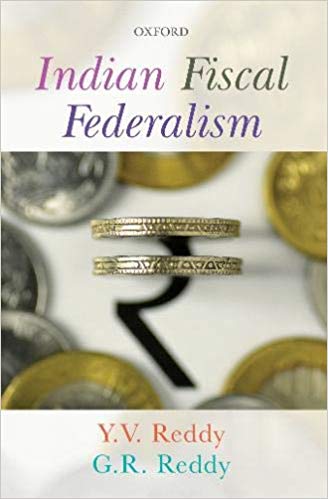It is rare to find books which are easy to read even though they are dealing with relatively non-readable topics such as Fiscal management, Institutional development and Policy formulation. This book, while it pulls no punches on these usually convoluted issues, is both lucidly simple and yet packed with information, which is presented in a very readable manner.
The debate on Centre-State relations, as the book blurb points out, is often conditioned by a presumption about the relative efficiencies of the Centre and the States. It submits that while there is often an impression that the States are profligate relative to the Centre, the revenue and fiscal indicators do not support this view. Similarly, it brings out that the often-contended view that States do not, in comparison to the Centre, adequately emphasize social expenditure, need empirical evidence to validate presumptions regarding the relative efficiencies. The authors point out that there has actually been more competition between the Centre and the States in providing ‘Private Goods’ or subsidized private goods than in the area of securing provision of Public Goods such as ‘Law and Order’, Roads etc. The book also points out that there can be varying assessments of the level and usefulness of social expenditure, converting the debate, in the words of the authors, ‘in practice, as a game in politics…..played between the union and the states’. The book has been composed to allow both practitioners and non-practitioners to understand the nuances of this game and concludes, in the last chapter, with a nuanced advisory on the terms of reference issued recently to the 15th Finance Commission.
The authors are YV Reddy, a former Governor of Reserve Bank of India and Chairman of the 14th Finance Commission, and GR Reddy, a 1971 batch Indian Economic Service officer (who has served at both the Centre and in State positions, mainly in the areas of Public Finance and Centre-State relations), currently the Adviser (Finance) to the Government of Telangana, and had been an Adviser to the 13th Finance Commission. What is not brought out is that YV Reddy had also, amongst his other public service contributions, functioned as an adviser to the People’s Republic of China, at the behest of an UN agency, for reform of their fiscal management systems in the 1990s and in a way contributed to the Chinese miracle. It is the perception of some, who had occasion to work commercially in China, that the Governors (of provinces) and Mayors (of cities) in China (but also other countries like USA/Canada) are far more businesslike and task-focused and in a way alive to the necessity of pampering investor egos than any public figure in India. This could well be happening, not because of differences in national character or in types of government, but because the fiscal power balance is far more centralized in India, making the line executives less aware/ troubled about not only of the importance of the need, but also about what actually helps, to grow revenue. It is therefore a pity that the authors have not added inter-country studies into their story.

